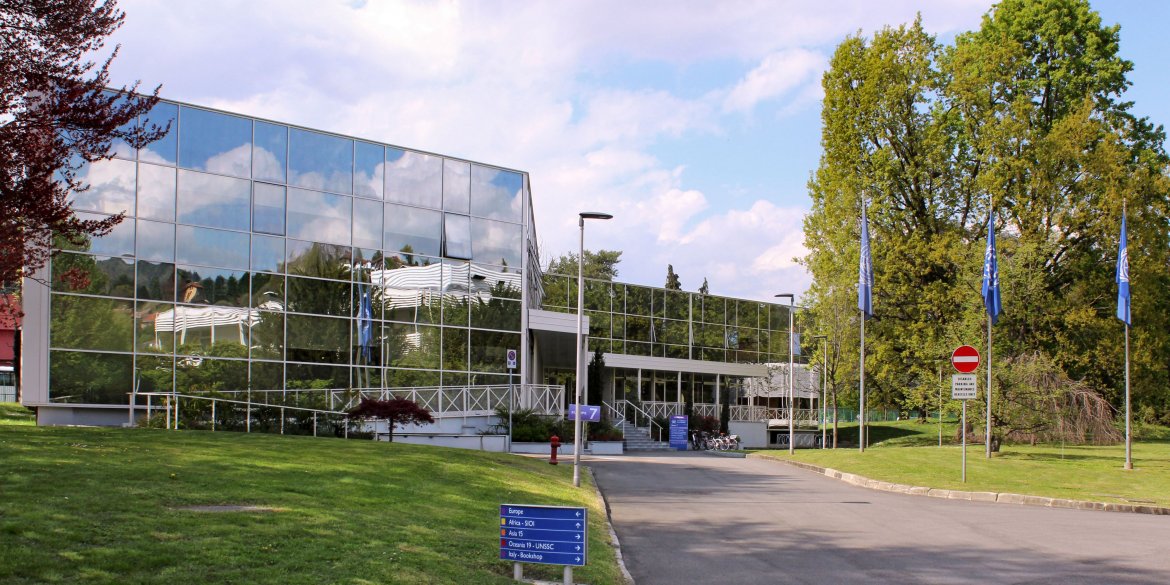Seeds of Sustainability
Seeds of Sustainability
What do soap dispensers and overpriced bottled water have in common? Luigi Buson, Chief Operations Officer at the ITCILO, is at the forefront of the campus’ sustainability initiatives
5 October 2019

What do soap dispensers and overpriced bottled water have in common? On a rather rainy Tuesday afternoon, I sat with the International Training Centre of the ILO’s Chief Operations Officer, Luigi Buson, who is at the forefront of the campus’ sustainability initiatives. Read on to learn more.
From Corporate to Climate
Coming from a background in the automobile business, spearheading a sustainable campus programme seemed atypical. However, Luigi reassures that “now sustainability is an issue everywhere. Even the most traditional companies are progressively shifting towards sustainability.”
To be sustainable or not to be. There is no question.
After joining the Centre in 2015, Luigi gained a new perspective from the international community found on campus. The commitment to the 17 Sustainable Development Goals motivated him to implement these values into the campus operations.
“It didn’t start as a top-down, fully comprehensive concept,” Luigi explains, “it’s more about changing a mindset.” The collective push to shift towards more sustainable practices came from various departments: Facility and Internal Services, Catering, etc. “Every time that we manage new projects or new initiatives in our operations we try to steer our actions towards a more sustainable profile,” he affirms.

A Soapy Success
Among the many sustainability projects developed one particularly stands out: new soap dispensers in the residential facilities.
“The dispensers touch various aspects of sustainability. On one end, it’s eliminating plastic,” Luigi shares. In the past, the campus would discard 40,000 small, plastic shampoo and shower gel bottles per year. “On the other hand, the product in the dispenser is better than the one you can get in small bottles,” he elaborates. The new solution is eco-friendly and pollutes much less compared to traditional shampoos or shower gels.
“And finally, the Shea butter. It’s produced in Burkina Faso by a small enterprise run by women who are trying to transform a traditional practice into a business,” he reveals.
The impact is threefold: promotes environmental sustainability, gender equality, and decent work.
Nevertheless, these changes take time to adopt. The first reactions were negative and participants complained about the reduced availability of products in the room. “We are not going to change our mind for that,” he states, “What we do is not always immediately perceived and appreciated by the community.”
Planet or Plastic?
With disposable plastic filling our landfills and oceans, a systemic change is in order. Luigi highlights the steps the Centre is taking: “We don’t offer plastic water bottles. In addition, we decided to set a penalizing price for the new, glass water bottles. They’re 1.50€, which is very high priced.”
We tend to be quite radical.
The ultimate goal is to motivate staff and participants to refill their water bottles at the free dispensers. In 2020, the disposable cups by the water dispensers will also be removed.

Smart Mobility
A topic of continued concern is mobility. 95% of staff cars are traditional. “Now we have one or two electric cars and some hybrid cars,” Luigi underlines. In addition, all internal providers are equipped with electric cars for maintenance, cleaning, transportation, reception, and catering.
We try to set an example in our community. We want to encourage a model of sustainable mobility.
Participants fly from all over the world to attend courses on campus. As a result, the Centre confronted its carbon footprint and now offsets its carbon emissions. “Now, we are carbon neutral,” declares Luigi.
A future plan is to attract the Olli pilot project, a self-driving electric shuttle that would spend at least three months on campus. The future on wheels.

Strategic Sustainability
The Centre remains committed to supporting these initiatives and developing new ones. A key point of the strategic plan is sustainability.
Sometimes sustainability may be considered a privileged luxury. However, the Centre sees it differently: “For us, it’s a coin with three sides. The first is a 360-degree vision of sustainability. The second is streamlining, being more sustainable is less expensive. The third is customer delight,” Luigi explains.
At the end of the day, you spend less, you consume less, you are more sustainable, and your community is happy.


